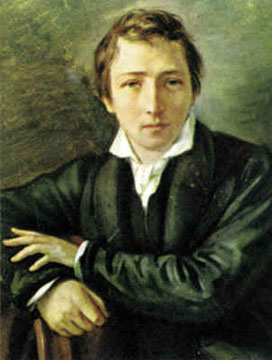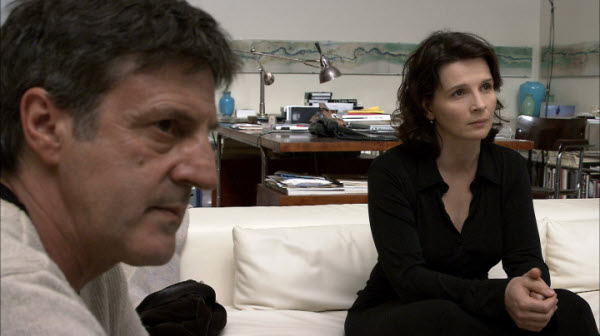The conclusion to a short story ("Octavia") by this French writer. You can read the original here.
"But where before had this image appeared to me? Ah, I have already told you that! It was in Naples, three years ago. I had an encounter one night near the Villa Reale with a young girl that looked like you, a pious creature whose art was to weave gilded embroideries to adorn her church. In spirit she seemed lost; I took her home although she spoke to me about a lover she had in the Swiss Guard and who she was afraid might drop by. Nevertheless she did not hesitate to confess that I pleased her more greatly. What should I tell you? That whole evening I lost myself to reverie and headiness and imagined that this woman, whose language I could barely understand, was actually you come to me in enchanted form from up above. Why should I hush up this adventure and the bizarre delusion that my soul accepted without any pain, especially after a few glasses of foamy lacryma Christi poured for me at dinner? The room which I entered had something mystical either by chance or by the particular selection of objects it contained. A black Madonna cloaked in rags, whose old finery had been entrusted to my hostess for restoration, was sitting on a chest of drawers next to a bed with baize green curtains; a figure of Saint Rosalie wreathed in roses seemed from afar to be protecting the cradle of a child; the walls white with lime were decorated with old paintings of the four elements depicting the mythological divinities. Add to this a fine assortment of brilliant fabrics, artificial flowers, and Etruscan vases; then mirrors surrounding one copper light reflected so splendidly, and a Treatise on divination and dreams that made me think that my companion was a sorceress or at least a gypsy.

"A pleasant old woman with solemn features would come and go, bringing us things. I think it had to be her mother! And I, pensive as ever, never took my eyes off her nor said a word – she who could not stop reminding me of you.
"And this woman kept repeating to me: 'Are you sad?' And I responded: 'Do not talk. I can hardly understand what you are saying.' Both listening to and speaking Italian tired me out immensely. 'Oh!' she said. 'I know how to speak differently.' And suddenly she broke into a language that I had never heard before. Sonorous and guttural syllables, twitterings full of charm; doubtless an ancient tongue: Hebrew, Syriac, I know not. She smiled at my surprise and went over to the chest of drawers. From here she took out some costume jewelry, necklaces, bracelets, a tiara. Putting on the jewelry there, she returned to the table and remained serious for a long time. The old woman came back in and seeing her thus, began laughing vociferously and said to me, I believe, that this what she looked like at celebrations. At this point the child awoke and began to cry. The two women ran over to the cradle, and soon enough the young woman was back with me, this time holding the bambino who had just been mollified.
"She spoke to the child in the language that I had so admired, and she kept him amused with graceful prods and pokes. And I, hardly accustomed to wines burned by Vesuvius, I sensed the room and its contents spinning around. This woman of curious manners and dressed like a queen, proud and capricious, seemed to me one of the magicians of Thessaly to whom one gives one's soul for a dream. Oh, why was I not afraid to relate all of this to you? Because it was nothing more than a dream, a dream in which you alone reigned!
"I tore myself from this phantom that seduced and scared me at the same time and wandered through the deserted city until the first church bells. Then, sensing dawn's rosy fingers upon my neck, I amended my steps through the small streets behind Chiaia and began to climb up Posilippo above the grotto. Arriving at the summit, I walked around gazing at the already-blue sea, the city emitting only early morning sounds, and the islands in the bay where the sun had begun to engild the villa roofs. I was not saddened in the least. I walked with broad strides, rolled in the wet grass, but in my heart sank deeper into notions of death.
"O gods! I know not what profound sadness resided in my soul, but it was nothing more than the cruel thought that I was not loved. I had seen as the phantom of happiness, I had employed all the gifts of God, I was beneath the most beautiful sky in the world, in the presence of nature at its most perfect, at the greatest spectacle that man is allowed to behold, but four hundred leagues away from the only woman who existed for me and who knew nothing of me, not even of my existence. Not loved and without hope ever to be loved! And so it was here that I sought to seek compensation from God for my singular existence. There was but one step to take: at the location where I found myself, the mountain was cut like a cliff, the sea moaned below, blue and pure, and I would only suffer for a second. Oh, the dizziness of that thought was terrible! Twice I hurled myself down and I know not what power returned me alive to land which I grasped. No, my God, you did not create me for eternal suffering, and so I will not offend you with my death. But give me the resolution that leads some to thrones, some to glory, and others to love!"
During this strange night a rather rare phenomenon had taken place. Towards the end of the night all the openings to the house in which I found myself were lit up; a warm, sulphuric dust prevented me from breathing, and leaving my easy conquest asleep on the terrace, I set out through the alleyways which led to Château Elme, and as I clambered up the mountain, the pure morning air came and inflated my lungs. I rested sumptuously on the vine arbors of the villas and fearlessly contemplated Vesuvius, newly bound in a cupola of smoke.
And it was here that I was seized with the dizziness of which I spoke. The thought of the encounter with the English girl roused me from the fatal ideas which I had conceived. After having refreshed my mouth with one of the enormous bunches of grapes sold at the market by women vendors, I headed to Portici to visit the ruins of the Herculaneum. All the roads were sprinkled with a metallic ash. Arriving at the ruins I descended into the underground city and strolled for a time from building to building, trying to extract from each monument the secret of its past. The temple of Venus and that of Mercury spoke in vain to my imagination; they needed to be populated with the living. I went back to Portici, stopped pensively below the arbor and waited there for my stranger to come.
She was not long in coming, steering her father's wretched gait. She seized my hand and said: 'It's alright.' We hailed a small coach and went to visit Pompeii. What happiness filled me as I guided her through the silent streets and the old Roman colony! I had studied the most secret passages in advance, and when we arrived at the small temple of Isis I had the pleasure of explaining to her in faithful detail the religion and ceremonies about which I had read in Apuleius. She wanted to play the role of the Goddess herself, whereas I was tasked with the role of Osiris in which I was to explain the divine mysteries.
Dreaming, seized by the grandeur of the ideas which we had begun to raise, I dared not speak to her of love ... She thought me so cold that I had to be reproached, and then I confessed that I no longer felt worthy of her. I related to her the story of that apparition which had awakened a past love within my heart, as well as all the sadness which had constricted me that fatal night in which the phantom of happiness had been nothing more than a lie.
Alas, all of this is very distant from us! Ten years ago, coming from the East, I went back to Naples. I went down to the hotel of Rome, and again I found the English girl. She had married a famous painter who had been stricken with complete paralysis shortly after their marriage. Lying on a daybed, he had almost no movement in his facial features apart from his large black eyes, and since he was still young he could not hope that other climes would provide relief. The poor girl had devoted her existence between caring for her father and caring for her husband, and still, her softness and virginal candor could not relieve the atrocious jealousy that seethed in the latter's soul. Nothing could ever bring him to let her go free during their walks, and he reminded me of that black giant who lurked eternally in the cavern of the djinns, with his wife continuously having to stave off sleep. O mystery of the human soul! Should one descry in such a scene the cruel marks of the vengeance of the gods?
I could only endure a day of this anguish. The boat that took me back to Marseilles carried with it like a dream the memory of this cherished apparition, and I thought that perhaps I had forsaken my happiness there. And its secret Octavia will guard with her always.
 Wednesday, December 3, 2014 at 14:12
Wednesday, December 3, 2014 at 14:12  I had a dream in which I cried:
I had a dream in which I cried:  Heine in
Heine in  German literature and film,
German literature and film,  Poems,
Poems,  Translation
Translation 




